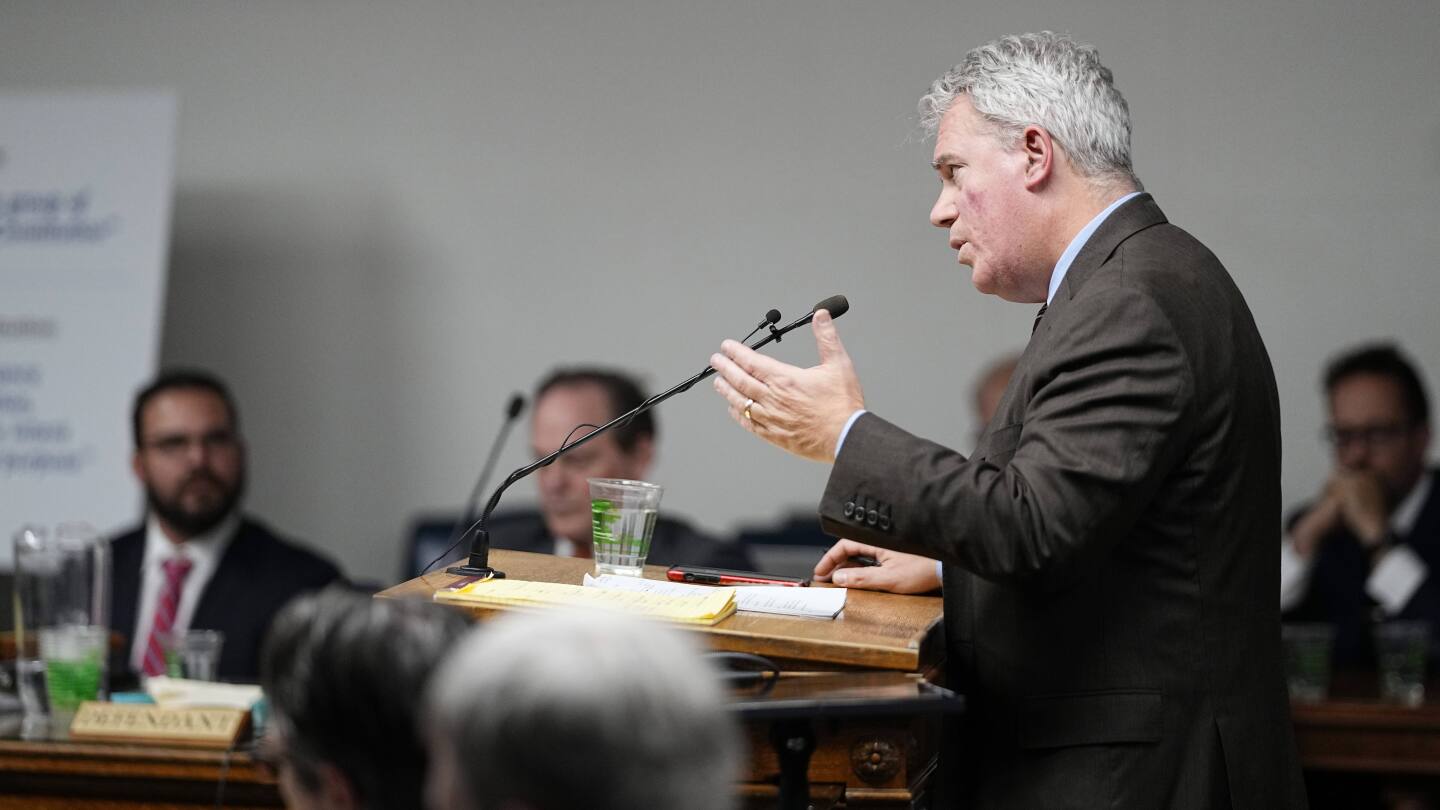- cross-posted to:
- news@dubvee.org
- cross-posted to:
- news@dubvee.org
A Colorado judge on Wednesday heard closing arguments on whether former President Donald Trump is barred from the ballot by a provision of the U.S. Constitution that forbids those who “engaged in insurrection” from holding office.
The hearing came on the heels of two losses elsewhere for advocates who are trying to remove Trump from the ballot under Section Three of the 14th Amendment, which bars from office those who swore an oath to uphold the U.S. Constitution and then “engaged in insurrection” against it. The measure has only been used a handful of times since the period after the Civil War, when it was intended to stop former Confederates from swamping government positions.
Last week, the Minnesota Supreme Court dodged the question of whether the provision applies to Trump, who is so far dominating the Republican presidential primary. It dismissed a lawsuit to toss him off that state’s primary ballot by saying that political parties can allow whomever they want to qualify for primaries.
The court left the door open for a general election challenge if Trump becomes the GOP nominee.
The elections commissions absolutely have the power to determine who gets to appear on the ballot…
The GOP can nominate whoever they want. That doesn’t mean they automatically get to be on the ballot.
Yeah that was a ridiculous cop out. Basically they can’t determine if he’s allowed on the ballot until he’s on the ballot.
Which arguably is the worst scenario for the party itself. Anyone that cares about the Republican Party instead of just Trump would be demanding having clarity about this as soon as possible.
That would require them to care about democracy. They do not. They don’t care if rules are broken or things are unfair. They simply want to seize power, and cannot yet get away with ignoring all the rules to do so. Yet.
Even if you think this argument is sound - and I’m not strictly opposed to it - I think it’s probably wisest to tie this condition to an actual relevant criminal conviction in a court of law. You really don’t want the precedent of any random judge or bureaucrat being able to just casually disqualify a candidate by excessively stretching some words, unless you want some random GOP election official deciding that Joe Biden actually engaged in insurrection by illegally taking office after stealing an election.
any random judge or bureaucrat being able to just casually disqualify a candidate by excessively stretching some words
Not even remotely close to what’s happening here.
The sticky part is that the precedent is already that no conviction is needed
Sure, but I think it’s not unreasonable to make some kind of distinction between serving in the armed forces or government of the literal Confederacy and the events of January 6th. At the very least, the entire existence of the Confederacy was de jure illegal, as was any non-trivial engagement with its government. Amnesty was granted as a matter of political pragmatism, not of law.
Don’t get me wrong, I absolutely believe that Trump being barred from assuming the Presidency again is absolutely a good thing, without reservation. My concern is what might happen after that can of worms gets opened.
There are a couple spots in the Constitution that specifically mention the need for conviction for something to take effect, and section 3 of the 14th amendment is not one of them. We do have appeals for the rogue judge or whatever, and I think most realize that if they act too egregiously that appeal on their record won’t look good. Also, Congress has the final say on this (to allow someone to take office, at least) per the last sentence of that section.
This is the best summary I could come up with:
DENVER (AP) — A Colorado judge on Wednesday heard closing arguments on whether former President Donald Trump is barred from the ballot by a provision of the U.S. Constitution that forbids those who “engaged in insurrection” from holding office.
The hearing came on the heels of two losses elsewhere for advocates who are trying to remove Trump from the ballot under Section Three of the 14th Amendment, which bars from office those who swore an oath to uphold the U.S. Constitution and then “engaged in insurrection” against it.
Trump attorney Scott Gessler told Colorado District Judge Sarah B. Wallace during closing arguments that the rulings in Minnesota and Michigan demonstrate “an emerging consensus here across the judiciary across the United States.” Throughout the weeklong hearing that concluded earlier this month, he said the plaintiffs had failed to show that the 14th Amendment’s insurrection provision applies to Trump.
There are a number of ways the case can fail: Wallace could, like the Minnesota high court, say she is powerless in a primary or, like the Michigan judge, defer to Congress’ judgment.
An attorney representing Colorado Secretary of State Jena Griswold urged the judge not to dodge the constitutional issues by ruling, as the Minnesota Supreme Court did, that she did not have the power to remove someone from a primary ballot
The petitioners in the case called a legal scholar who testified that the authors of Section 3 meant it to apply even to those who offered aid to the Confederate cause, which could be as minimal as buying bonds.
The original article contains 948 words, the summary contains 259 words. Saved 73%. I’m a bot and I’m open source!
Here’s the issue that I have with this line of thinking.
Sure, the parties are private entities and can therefore put up whoever they want to be nominated. I can see that argument. But shouldn’t those political parties be trying to put someone up who is actually qualified? Wouldn’t allowing Trump to win the primary and then disqualify him on 14A grounds actually cause even more problems, as the party would then have no viable candidate at all?
Of course the cynic in me is saying that this is intentional: Let Trump win the primary, then when people move to disqualify him from the general, the courts would then just say “Sorry guys, it’s too close to the election so Trump gets to stay on the ballot.”, as this would essentially invalidate section 3 of the 14th amendment because there would be no time period available where the 14th can actually be invoked. Can’t do it before the primaries because the parties can put forth whoever they want, can’t do it after the primaries because it’s too close to the general.
(and the even deeper cynic in me thinks that this will be a first step towards invalidating other, shall we say “undesirable”, parts of the Constitution by simply making it impossible to actually enforce them. )
“The petitioners are asking this court to do something that’s never been done in the history of the United States,” [Trump attorney] Gessler said.
“We are here because, for the first time in our nation’s history, the president of the United States engaged in an insurrection,” [plaintiff attorney] said, summing up their case. “Now he wants to be president again. The Constitution does not allow that.”
I do appreciate the plaintiff’s response here. Trump and Co keep acting like this is extraordinary election interference, when in reality it’s just the logical response to what was an extraordinary attempt at a sitting president to overthrow our government.
GOP will appeal and petition for cert. Thomas will grant. It’s over.
I don’t think so. Trump is a pretty much a dictator in waiting, and dictators do not need a supreme court.







